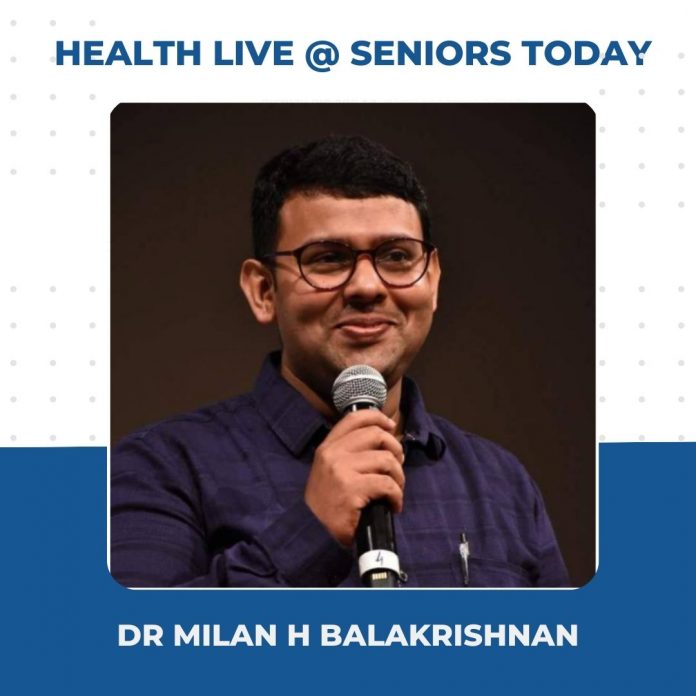The third session of Health Live @ Seniors Today saw the leading psychiatrist address specific queries around mental health for senior citizens given the Covid-19 pandemic scare
By A Staff Writer
Last week, on Health Live @ Seniors Today, we had well-known psychiatrist Dr Milan H Balakrishnan speak with Seniors Today readers. While the ‘unlock’ continues to makes it way to the new normal, an exclusive Q&A with Dr Balakrishnan on mental health for seniors got attendees a better understanding of how mental and physical health go hand in hand.
The impact of the Covid-19 crisis on mental health needs to be addressed across the spectrum. Loneliness, depression and anxiety put the elderly in a very vulnerable spot.
[embedyt] https://www.youtube.com/watch?v=yCd__jt67Po[/embedyt]
Here are takeaways from the webinar that will help you take better care of yourself.
- A routine is important – Maintaining a basic routine will help you keep busy through the day. Try to sleep and wake up at the same time every day. Some 20-30 mins of exercise or pranayama will keep your physical health in check – this could be walking around for 15-20 mins in the house itself.
- Anxiety makes people misinterpret situations – Financial worries often drive anxiety; this leads to interpreting things in unusual ways. If people wish well, the person suffering from anxiety will interpret it differently.
- Find your motivation – Now that you are at home and don’t feel the motivated to do anything? Well it’s time to look back and get in touch with things you wanted to do earlier. It could be anything as long as you enjoy and feel motivated.
- Better self-care than hospital visits – Adequate self-care will not only help you physically, it will help you mentally and as well as financially. It is a cycle, if you care for yourself rest will fall in place.
- Importance of a social support system – A social support system could be your friends, your neighbours, an organisation, or a community it could be anybody as long as you can open up to them about anything and everything. Create a group of people around you with whom you can laugh as well as share your anxieties. This will ensure that you have people to turn to in times of mental health crisis or otherwise.
- Lack of sleep affects immunity – Anxiety, depression…tends to impact the quality of sleep which in turn effects immunity. If you are facing difficulty to sleep, get to know the cause of it. Once you know the reason behind your sleepless nights, share it with your support system. This may ease the intensity of sleep impairment.
- Mental illnesses are genetic – Dementia, Parkinson’s and like are illnesses that gets passed down genetically. If your family had a history of these illnesses you are likely to get them. Dementia… progresses slowly, thus can be controlled. Sitting ideal may aggravate the illness, so keep your mind active and alert with activities that you enjoy. It can be cooking, gardening, reading a book, painting or even playing an instrument.
- Restrict overload of information – Too much of news will cause anxiety and worry. This will affect your quality of sleep further affecting your immunity. Watch news once or twice in a day to catch up with the headlines. Refrain from consuming news through the day.
- Too much alcohol consumption increases chances of dementia – Alcohol helps reduce anxiety but if the short-term consumption turns into a long-term consumption, alcohol increases the chances of dementia. The more alcohol you have the less effective it will be.
- Say NO to stimulants before bed – A good sleep hygiene will ensure a good night sleep. Avoid tea, coffee, tobacco, alcohol… instead create an atmosphere that will induce good sleep such as warm water bath, comforting music, dim the lights, read a soothing book…
Take adequate care for your physical health, this will ensure a better mental health.








